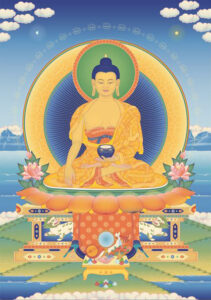
Yes – there is a textbook answer, which we’ll come to. But it’s more interesting to first think about what the idea of “Buddha” means for human beings in practical terms.
Through self-reflection, most of us feel that we have some positive qualities and habits, and some things that could be done with some work! We can look at some of the times in our lives where things haven’t gone all that well, and think – “If only I hadn’t said that, or said it differently”. Or, “If only I’d had more clarity and perspective when I made that decision”. Ideally, if we reflect like this, it’s in a balanced way, not beating ourselves up, and also with awareness of the things we do well.
But suppose we could improve our positive qualities and habits without limit. For example, think of the kindest and most generous person we know. Imagine how different our life could be if we could be like that. We’re not talking about just making an effort to be like that, or simply appearing to be like that. Imagine instead if heartfelt kindness and generosity continuously shaped our life, like a second nature.
And then imagine that our kindness and generosity had no limit – that we weren’t held back by a lack of energy, or doubts, or worries, or memories of wrongs that have been done to us. Supposing we could extend this natural kindness and generosity to every living being that we come across; that the experience of being in the company of any other living being would bring genuine joy – as if we’d just encountered our dearest friend or family member, after having been separated from them for a long time. And suppose also that we had such a clear and peaceful mind, we’d always instinctively know what the best thing to do would be, both for ourselves and others, and the thing that would make our life whole and meaningful, its basic driving force, would be to benefit others.
That’s what the state of a Buddha, or enlightenment, would mean for us. According to Buddhist teachings, this has meaning for all of us because all beings have Buddha potential. Buddha potential is the very nature of our mind. Anyone can start cultivating their potential for positive minds and as we do, progressively the quality of our life improves.
The Sanskrit word Buddha is usually translated as “awake”. It’s as if, at the moment, because our minds are absorbed in busyness and driven by habit, we’re not awake to our full potential. A similar idea is that Buddhas are “free of obscurations”. The beautiful and inspiring idea is that as we wake from our slumber, and our obscurations progressively dissolve, our own true nature of compassion, clarity and wisdom shine through.

After joining and going to my first Learn to Meditate class, I came home to review my thoughts and explore the society more. Thank you for sharing this thought. It has helped my understanding and filled a gap on my spiritual journey. I have never thought along the lines of obscurations before and have instead focused on the acceptance of a pain body. The concepts are similar but there is a greater positiveness in what you have said 🙂
Thank You
Thanks Michael. Yes, the more I have learned about Buddhism, the more strongly I feel that not only is its perspective deeply realistic, but also radically optimistic. Best regards, Martin